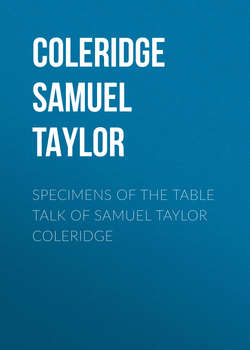Читать книгу Specimens of the Table Talk of Samuel Taylor Coleridge - Coleridge Samuel Taylor - Страница 61
TABLE TALK
May 30. 1830
ОглавлениеTRANSLATION OF THE PSALMS
I wish the Psalms were translated afresh; or, rather, that the present version were revised. Scores of passages are utterly incoherent as they now stand. If the primary visual images had been oftener preserved, the connection and force of the sentences would have been better perceived.57
57
Mr. Coleridge, like so many of the elder divines of the Christian church, had an affectionate reverence for the moral and evangelical portion of the Book of Psalms. He told me that, after having studied every page of the Bible with the deepest attention, he had found no other part of Scripture come home so closely to his inmost yearnings and necessities. During many of his latter years he used to read ten or twelve verses every evening, ascertaining (for his knowledge of Hebrew was enough for that) the exact visual image or first radical meaning of every noun substantive; and he repeatedly expressed to me his surprise and pleasure at finding that in nine cases out of ten the bare primary sense, if literally rendered, threw great additional light on the text. He was not disposed to allow the prophetic or allusive character so largely as is done by Horne and others; but he acknowledged it in some instances in the fullest manner. In particular, he rejected the local and temporary reference which has been given to the 110th Psalm, and declared his belief in its deep mystical import with regard to the Messiah. Mr. C. once gave me the following note upon the 22d Psalm written by him, I believe, many years previously, but which, he said, he approved at that time. It will find as appropriate a niche here as any where else:—
"I am much delighted and instructed by the hypothesis, which I think probable, that our Lord in repeating Eli, Eli, lama sabacthani, really recited the whole or a large part of the 22d Psalm. It is impossible to read that psalm without the liveliest feelings of love, gratitude, and sympathy. It is, indeed, a wonderful prophecy, whatever might or might not have been David's notion when he composed it. Whether Christ did audibly repeat the whole or not, it is certain. I think, that he did it mentally, and said aloud what was sufficient to enable his followers to do the same. Even at this day to repeat in the same manner but the first line of a common hymn would be understood as a reference to the whole. Above all, I am thankful for the thought which suggested itself to my mind, whilst I was reading this beautiful psalm, namely, that we should not exclusively think of Christ as the Logos united to human nature, but likewise as a perfect man united to the Logos. This distinction is most important in order to conceive, much more, appropriately to feel, the conduct and exertions of Jesus."—ED.
